Apr 19, 2025
Apr 19, 2025
Bhagat Kabir (1440–1518 CE) was born in Banaras, now known as Varanasi a city in northern India, a holy place by Hindus. Although he was born in a poor family of weavers, had no formal education; yet his writings continue to captivate and resonate with the masses crossing the religious boundaries. Not much is known about his life, even the lifeline mentioned in the first line is the best guess. Through his writings, he became well known as a teacher and a social reformer. His pithy couplets known as Dohas and Saloks are packed with spiritual wisdom. He challenged the strict orthodoxy of Hindu as well as Muslim priests.
When the Muslim clergy proclaimed that their religion was superior to Hindus, he challenged the claim by asking that since God made both Hindus and Muslims, how He could discriminate against either. Let us see his rationale:
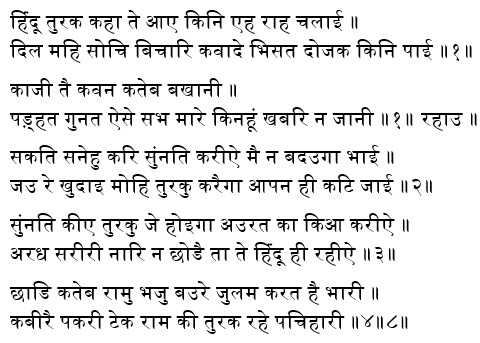
Hindu turak kahaa te aae kin eh raeh chalaiee.
Dhil meh soch bichaar kavaadhe bhisat dhojak kin payee. 1.
Kaajee tai kavan kateb bakhaanee.
PaRhat gunat aaise sabh maare kinahoo(n) khabar na jaanee. 1. Rahaau.
Sakat saneh kar su(n)nat kareeaai mai na badhaugaa bhaiee.
Jau re khudhai moh turak karaigaa aapan hee kaT jaiee. 2.
Su(n)nat ke'ee turak je hoigaa aaurat kaa kiaa kareeaai.
Aradh sareeree naar na chhoddai taa te hi(n)dhoo hee raheeaai.3.
Chhaadd kateb raam bhaj baure julam karat hai bhaaree.
Kabirai pakaree Tek raam kee turak rahe pachihaaree . 4.8.
— (SGGS, Pg. No. 477)
Translation: O quarrelsome person! (Instead of always arguing to prove your religion to be a true religion) contemplate within your mind from where the Hindus and Muslims have come from (other than from God)? Who put them on these different paths (Since God has created both, how can He discriminate against either?) (Just being Hindu or Muslim) who will go to heaven and hell? (i.e., just by calling yourself Muslim you cannot go to heaven and just being a Hindu one will not go to hell). 1. O Qazi, which books are you reading (and telling others that the Muslims will go to heaven and Hindus will go to hell)? Scholars like you (who are biased, read religious books with prejudiced eyes) have all withered away. None of them have discovered the inner meaning. 1. Pause. Because of the love of a woman, if circumcision is done; I do not believe in it (that it has anything to do with getting close to God). If God wished me to be a Muslim, it would be circumcised by itself. 2. If only circumcision makes one a Muslim, then what about a woman? Throughout the life, she is man’s partner, and she does not leave him. (Therefore, instead of hanging in between) it is better to remain a Hindu. 3. Give up debating about holy books and remember God (instead of meditating on God, you are engulfed in futile arguments), you fool, you are hurting yourself. Kabir has grasped hold of God's support, and the (confrontational) Muslims (engaged in futile arguments) have utterly failed. 4. 8.
Kabir was trying to dispel arrogance born out of conceit of faith and caste. The word ‘Turks’ was employed for people west of Indus and ‘Hindus’ for folks on the east side. Now, let us see what he had to say about other side of the spectrum, as he questioned Brahmin about their superior status in the words as under. He shared his firm conviction that Brahmin is one alone, who contemplates on Braham or Creator:
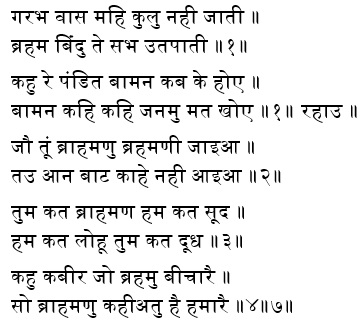
Garabh vaas meh kul nahee jaatee.
Braham bi(n)dh te sabh utapaatee. 1.
Kahu re pa(n)ddit baaman kab ke hoe.
Baaman keh keh janam mat khoe.1. Rahaau.
Jau too(n) braahaman brahamanee jaiaa.
Tau aan baaT kaahe nahee aaiaa. 2.
Tum kat braahaman ham kat soodh.
Hum kat lohoo tum kat dhoodh. 3.
Kahu kabir jo braham beechaarai.
So braahaman kaheeat haihamaarai. 4.7. — (SGGS, Pg. No. 324)
Translation: In the dwelling of the womb, there is no ancestry or social status. All have originated from the seed of God (i.e., God has created everyone by the same process.) 1. Tell me, O Pandit, O religious scholar: Since when have you become a Brahmin? Do not waste your life (in ego) by continually claiming to be a Brahmin. 1. Pause. If you are indeed a Brahmin, born of a Brahmin mother, then why weren't you born in by some other way? 2. (When both us are born same way,) How is it that you became a Brahmin, and I stayed of a low social status? How is it that I am formed of blood, and you are made of milk (instead of blood)? 3. Says Kabir, we consider that person to be a Brahmin who contemplates on God. 4. 7.
Guru Nanak
Now let us look at Guru Nanak Dev Ji’s life. Guru Nanak (1469-1539) was one of the greatest religious innovators of all time and the founder of the Sikh religion. In 1507 he went to River Bein in Sultanpur for his early morning bath and did not return for 3 days. The rumors were circulating that he drowned as even the divers could not locate the body. Once he came out his first statement was “There is no Hindu or Musalman.” Even in these words we can see Guru Ji’s thought process is no different from Bhagat Kabir’s although they have not seen each other or even heard from the other.
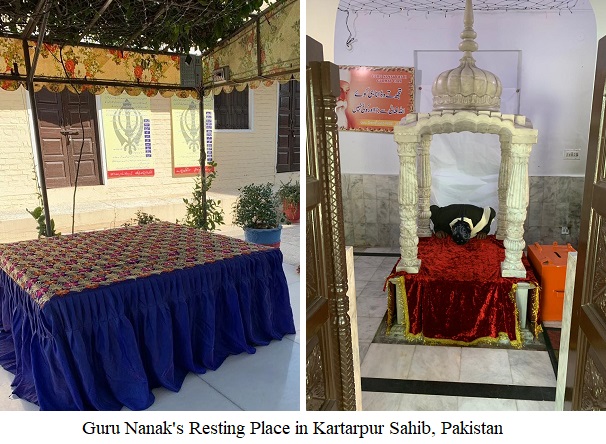
After the incident, Guru Ji decided to go on Udassis-long journeys, to spread this message. In the process of his journey to the east he passed through Kurshetra, Delhi, Mathura, Paryag, Ayudhya, and reached Varanasi (Banaras) around 1510. There Guru Ji stayed for about 15 days and met Bhagat Ravidas (1399-1520). From there Guru Ji went to Maghar spending 7 days there. So, it is quite likely that these two stalwarts had their meeting of minds there. Guru Ji collected writings of Ravidas, and Kabir Ji during this journey. These writings along with Guru Ji’s own writings were passed to successor Guru Angad Dev Ji and eventually reached the fifth Guru Arjan Dev Ji, who compiled Aad Granth were all these were enshrined in 1604 along with writings of other successor Gurus and Bhagats. It is worth mentioning that Guru Nanak Dev Ji was first to preserve the work of Bhagat Kabir.
Guru Nanak Dev like Bhagat Kabir rejected idol worship and the ritual barriers between castes based on the concept of strict caste system by birth. Gurdwara Sri Guru Ka Bagh, Varanasi (as Banaras is now known by) commemorates the visit by Guru Nanak. Although the garden (bagh) where Guru Ji stayed does not exist any longer but the Gurudwara marks the site of Guru Ji’s stay. In Banaras itself Guru Ji held that pilgrimage to holy spots and holy baths as totally irrelevant to man seeking salvation. Guru Ji said:
![]()
Teerath naavan jaau teerath naam hai. — (SGGS, Pg. No. 687)
Translation: Why should I bathe at sacred shrines of pilgrimage? The Naam, the Name of the Lord, is the sacred shrine of pilgrimage.
To both of them salvation is not after death, but while still alive. They considered themselves as brides and God as the sole Bridegroom. Kabir’s composition as under is an expression of his experience of this communion with God. Just as the Indian bride at the time of her wedding, dresses in red color, Kabir says that he has dyed himself red. Bhagat Kabir’s composition in SGGS is as follows:
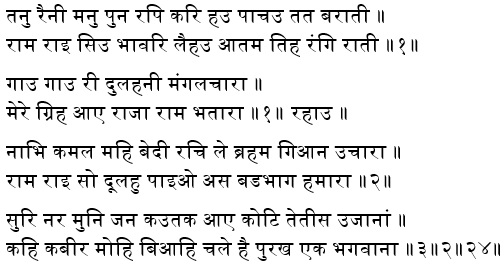
Tun rai-nee mun pun rap kar hau paachau tat baraatee.
Raam rai siau bhaavar laihau aatam teh rung raatee.1.
Gaau gaau ree dhulahanee ma(n)galachaaraa.
Maerh gireh aae raajaa raam bhataaraa.1. Rahaau.
Naabh kamal meh bedhee rach le braham giaan auchaaraa.
Raam rai so dhoolahu paio as baddabhaag hamaaraa. 2.
Sur nar mun jan kautak aae koat tetees aujaanaa(n).
Kaeh Kabir moh biaaeh chale hai purakh ek bhagavaanaa. 3.2.24
— (SGGS, Pg. No. 482)
Translation: I make my body (to dye my mind) the dyeing vat (i.e., I keep my mind on the body so that it does not go astray). Within it (adding water of Naam, dye of devotion), I dye my mind (with the dye of virtues, red in the color of love). I make the five virtues my marriage guests [Truth (Sat), Contentment (Santokh), Compassion (Daya), Righteousness (Dharam), and Humility (Nimarta)]. I take my marriage vows with God, my King; my soul is imbued with His Love. 1. Sing, sing, O recently married brides! (Five sense organs immersed in God’s devotion) the marriage songs of God because God, my King, has come to my house (heart) as my Bridegroom (the creator of the universe). 1. Pause. In my breath (taking the breath to the navel), I have made my bridal pavilion, and the Mantras of God’s wisdom are being chanted to solemnize the wedding. I have obtained the King (God) as my Husband - such is my great good fortune. 2. The angels, holy men, silent sages, and countless deities have come in their heavenly chariots (which represents the spiritual flight of the deities) to witness this spectacle of the marriage. Says Kabir, I have been taken in marriage by God. 3. 2. 24.
Kabir Ji used an allegory of the wedding to describe his relationship to immortal bridegroom God. The wedding becomes the initiatory ritual to perpetual wedding guaranteeing salvation in this life itself. When one’s mind is in tune with God, one feels as blissful as a bride on meeting her bridegroom. The five sense organs (e.g. sight, touch, sound, smell, and taste) are immersed in God’s devotion, feeling ecstatic as the newly married brides, singing wedding songs.
In the above Shabad, Bhagat Kabir has used numerous metaphors. To make the message unambiguously clear Guru Nanak Ji composed a similar Shabad in the same Raag. The Rahao Tuks of the two Shabads show close resemblance. Guru Nanak Ji’s Shabad in SGGS is as follows:
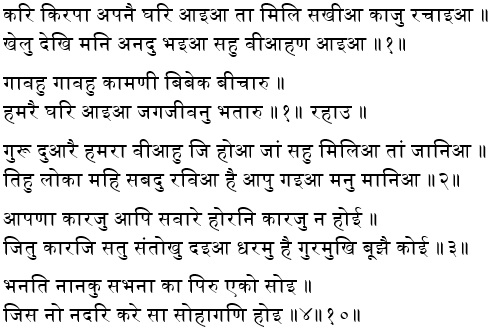
Kar kirapaa apanai ghar aaiaa taa mil sakheeaa kaaj rachaiaa.
Khel dhekh man anadh bhiaa sahu veeaahan aaiaa. 1.
Gaavahu gaavahu kaamanee bibek beechaar.
Hamarai ghar aaiaa jagajeevan bhataar. 1. Rahaau.
Guroo dhuaarai hamaraa veeaahu j hoaa jaa(n) sahu miliaa taa(n) jaaniaa.
Tih lokaa meh sabadh raviaa hai aap giaa man maaniaa. 2.
Aapanaa kaaraj aap savaare horan kaaraj na hoiee.
Jit kaaraj sat sa(n)tokh dhiaa dharam hai gurmukh boojhai koiee. 3.
Bhanat naanak sabhanaa kaa pir eko soi.
Jis no nadhar kare saa sohaagan hoi. 4.10. — (SGGS, Pg. No. 351)
Translation: When by His Grace, He came to my home (accepting my heart as His residence), then my companions (eyes, ears, tongue, etc.) joined to celebrate my marriage. Beholding this play (my effort), my mind became blissful; my Husband (Master) has come to marry me (to let me stay in His lotus feet). 1. O brides (my sense organs) so sing, repeatedly, the songs of wisdom and reflection (which can distinguish between virtue and evil). (O my tongue! Recite the glory of God so that I can refrain from blasphemy, O my ears! Listen to the glory of God so that I stop listening to blasphemy). My spouse, the Life of the world, has come into my home (heart). 1. Pause. When I was married with Guru’s guidance, I met my Husband (Master), and I came to know Him. The Word of His Shabad is pervading the three worlds; when my ego was quieted, my mind became happy. 2. He Himself arranges His own affairs; His affairs cannot be arranged by anyone else. By the affair of this marriage, truth, contentment, mercy, and faith are produced. Rare are the Gurmukhs who understand it! 3. Says Nanak that God alone is the Husband of all. She upon whom, He casts His Graceful Glance (by manifesting in that heart), becomes the happy soul-bride. 4.10.
As discussed above the essence of the shabad is in the Rahao Tuk, and in it Guru Ji describes his state of mind. He says that his sense organs repeatedly sing the songs of wisdom and reflect on the distinction between virtue and evil. Further, Kabir Ji has tried to make it clear that the God resides in everyone, yet a separate entity. He is free from the cycle of birth and rebirth unlike all other living creatures. Kabir has merged in that Supreme as:
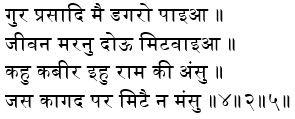
Gur prasaadh mai ddagaro paiaa.
Jeevan maran dhouoo miTavaiaa.
Kahu kabir ih raam kee a(n)s.
Jas kaagadh par miTai na ma(n)s. 4. 2. 5. — (SGGS, Pg. No. 871)
Translation: By Guru's Grace, (since) I have found the (true) Path (of life), both my birth and death have been erased (I am free of the birth & rebirth cycle). Says Kabir, (I have realized) that the one which resides inside me is part of It (God). It relates to each other like the ink and the paper on which it is written. 4.2||5.
Even Guru Nanak Dev Ji has shared the same aspect of relationship between God and man in these words:

“Kaiaa mahal ma(n)dhar ghar har kaa tis meh raakhee jot apaar.
Nanak gurmukh mahal bulaieeaai har mele melanahaar. 4. 5.”
— (SGGS, Pg. No.1255)
Translation: The body is a mansion, a temple, the home of the Lord; He has infused His Infinite Light into it. O Nanak, the Gurmukh is invited to the Mansion of the Lord's Presence; the Lord unites him in His Union. ||4||5||
Interestingly deaths of both Kabir Ji and Guru Nanak Dev Ji sparked a claim to the body by both Muslims and Hindus. Both Hindus and Muslims wanted to perform the last rites following their traditions. But when the sheets covering their body were lifted, only fresh flowers were there. Maghar is home to the tomb and Samadhi of Kabir Ji. Kartarpur now in Pakistan is home to the tomb and Samadhi of Guru Nanak Dev Ji. Even in their deaths Bhagat Kabir and Guru Nanak Dev Ji had united those devotees practicing different faiths, despite their being at loggerheads with each other. Even today both command respect from both the communities of Hindus and Muslims.
References:
1. Singh, Satbir. Baliyo Chirag (in Punjabi). New Book Company (2004)
2. Singh, Prof. Sahib. Bhagat-Bani Steek, Volume 5 (In Punjabi). Singh Brothers (2011)
3. Dharwadker, Vinay. Kabir: The Weaver’s Song. Penguin Books (2003)
4. www.Sikhitothemax.com
November 26, 2020